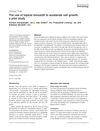 34 citations,
July 2011 in “Journal of Dermatological Treatment”
34 citations,
July 2011 in “Journal of Dermatological Treatment” Curcuma aeruginosa extract combined with minoxidil effectively treats male-pattern baldness.
 88 citations,
January 2013 in “Indian Journal of Dermatology, Venereology and Leprology”
88 citations,
January 2013 in “Indian Journal of Dermatology, Venereology and Leprology” Minoxidil and finasteride effectively treat hair loss.
 8 citations,
April 2017 in “International Journal of Dermatology”
8 citations,
April 2017 in “International Journal of Dermatology” Applying 5% minoxidil to fingernails can significantly increase their growth rate.

Treatments for hair loss vary, but cell-based options may be the future.
 10 citations,
May 2020 in “Journal of Dermatological Treatment”
10 citations,
May 2020 in “Journal of Dermatological Treatment” Microneedling with 5% minoxidil improves hair loss in Chinese men by activating Wnt/ß-catenin pathway.
 9 citations,
February 2005 in “The Journal of Men's Health & Gender”
9 citations,
February 2005 in “The Journal of Men's Health & Gender” Finasteride effectively treats male hair loss, increasing length and thickness.
5 citations,
March 2022 in “Frontiers in Medicine” PRP is effective for treating hair loss, especially with other treatments.
 27 citations,
May 2017 in “Marine Drugs”
27 citations,
May 2017 in “Marine Drugs” Undariopsis peterseniana extract helps hair grow by activating certain cell growth pathways and could be a new treatment for hair loss.
 54 citations,
February 1986 in “Archives of Dermatology”
54 citations,
February 1986 in “Archives of Dermatology” Higher minoxidil concentration (5%) works better for severe hair loss, with most patients seeing regrowth in 48-60 weeks.
 43 citations,
January 2007 in “American Journal of Clinical Dermatology”
43 citations,
January 2007 in “American Journal of Clinical Dermatology” Combined minoxidil and tretinoin solution works as well as regular minoxidil for male hair loss.
 17 citations,
March 2006 in “Journal of Cosmetic Dermatology”
17 citations,
March 2006 in “Journal of Cosmetic Dermatology” Hormonal changes during and after pregnancy can cause hair growth changes and hair loss, with treatments available for some conditions.
 January 2017 in “Springer eBooks”
January 2017 in “Springer eBooks” Over 40% of postmenopausal women experience hair loss, with treatments aiming to stop further loss and possibly thicken hair.
 June 2022 in “International journal of drug delivery technology”
June 2022 in “International journal of drug delivery technology” Nebivolol cream may be a promising hair loss treatment by improving blood flow and nourishing hair follicles.
 80 citations,
September 1984 in “Journal of The American Academy of Dermatology”
80 citations,
September 1984 in “Journal of The American Academy of Dermatology” 5% minoxidil helps hair regrowth in androgenic alopecia.
 40 citations,
May 1999 in “Journal of The European Academy of Dermatology and Venereology”
40 citations,
May 1999 in “Journal of The European Academy of Dermatology and Venereology” Treat hair loss with finasteride, minoxidil, or surgery; consider side effects and severity.
5 citations,
May 2022 in “Clinical & Experimental Metastasis” Minoxidil and ranolazine together can reduce the spread of certain breast cancer cells.
 64 citations,
July 2011 in “Dermatologic Therapy”
64 citations,
July 2011 in “Dermatologic Therapy” Scalp cooling can prevent chemotherapy-induced hair loss, and certain treatments can speed up hair regrowth, but more research is needed for better treatments.
 59 citations,
May 2014 in “Expert Opinion on Therapeutic Targets”
59 citations,
May 2014 in “Expert Opinion on Therapeutic Targets” The document concludes that targeting 5α-reductase, the androgen receptor, and hair growth genes, along with using compounds with anti-androgenic properties, could lead to more effective hair loss treatments.
 22 citations,
January 2017 in “Skin appendage disorders”
22 citations,
January 2017 in “Skin appendage disorders” The conclusion is that primary scarring alopecia is a complex condition that requires early and accurate diagnosis for effective treatment.
 40 citations,
January 2018 in “Pharmaceutics”
40 citations,
January 2018 in “Pharmaceutics” Eucalyptol and oleic acid in nanoemulsions improve minoxidil delivery to hair follicles, potentially enhancing hair loss treatment.
 January 2024 in “Journal of Cosmetic Dermatology”
January 2024 in “Journal of Cosmetic Dermatology” The 1565 nm non-ablative fractional laser is more effective and satisfying than 5% minoxidil for treating hair loss.
 7 citations,
December 2020 in “Dermatologic Therapy”
7 citations,
December 2020 in “Dermatologic Therapy” Injections with 0.5% minoxidil effectively treat female hair loss, increasing hair density and thickness.
 3 citations,
February 2021 in “Medical journal, Armed Forces India”
3 citations,
February 2021 in “Medical journal, Armed Forces India” Combination therapy promotes better hair growth and density.
 15 citations,
November 2017 in “Drug Delivery and Translational Research”
15 citations,
November 2017 in “Drug Delivery and Translational Research” Certain extracts from Curcuma aeruginosa Roxb. and germacrone can boost the skin's absorption of minoxidil, a hair growth promoter, making it more effective.
 27 citations,
December 2016 in “Dermatology and Therapy”
27 citations,
December 2016 in “Dermatology and Therapy” Certain skin conditions can indicate insulin resistance and should prompt lifestyle changes and medical treatment to manage underlying health issues.
Whale oil significantly promotes hair growth and may be a safe, effective alternative to minoxidil.
 67 citations,
March 1987 in “Journal of The American Academy of Dermatology”
67 citations,
March 1987 in “Journal of The American Academy of Dermatology” Minoxidil helps hair growth and prevents hair loss in androgenetic alopecia. It's safe and effective.
 November 1999 in “Journal of Cutaneous Medicine and Surgery”
November 1999 in “Journal of Cutaneous Medicine and Surgery” Treatments for hair loss include hormone modifiers, minoxidil, and hair transplant surgery.
 20 citations,
September 2015 in “Journal of The European Academy of Dermatology and Venereology”
20 citations,
September 2015 in “Journal of The European Academy of Dermatology and Venereology” Minoxidil foam promotes hair growth and reduces hair loss safely in men.
 20 citations,
February 1985 in “Archives of Dermatology”
20 citations,
February 1985 in “Archives of Dermatology” Minoxidil helps hair regrowth, especially with more indeterminate hairs.


























